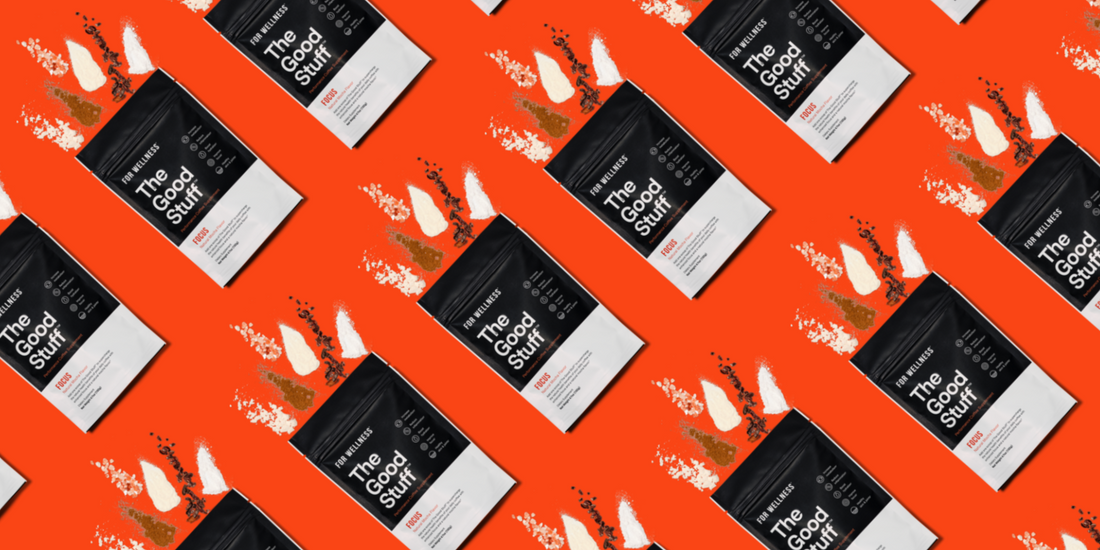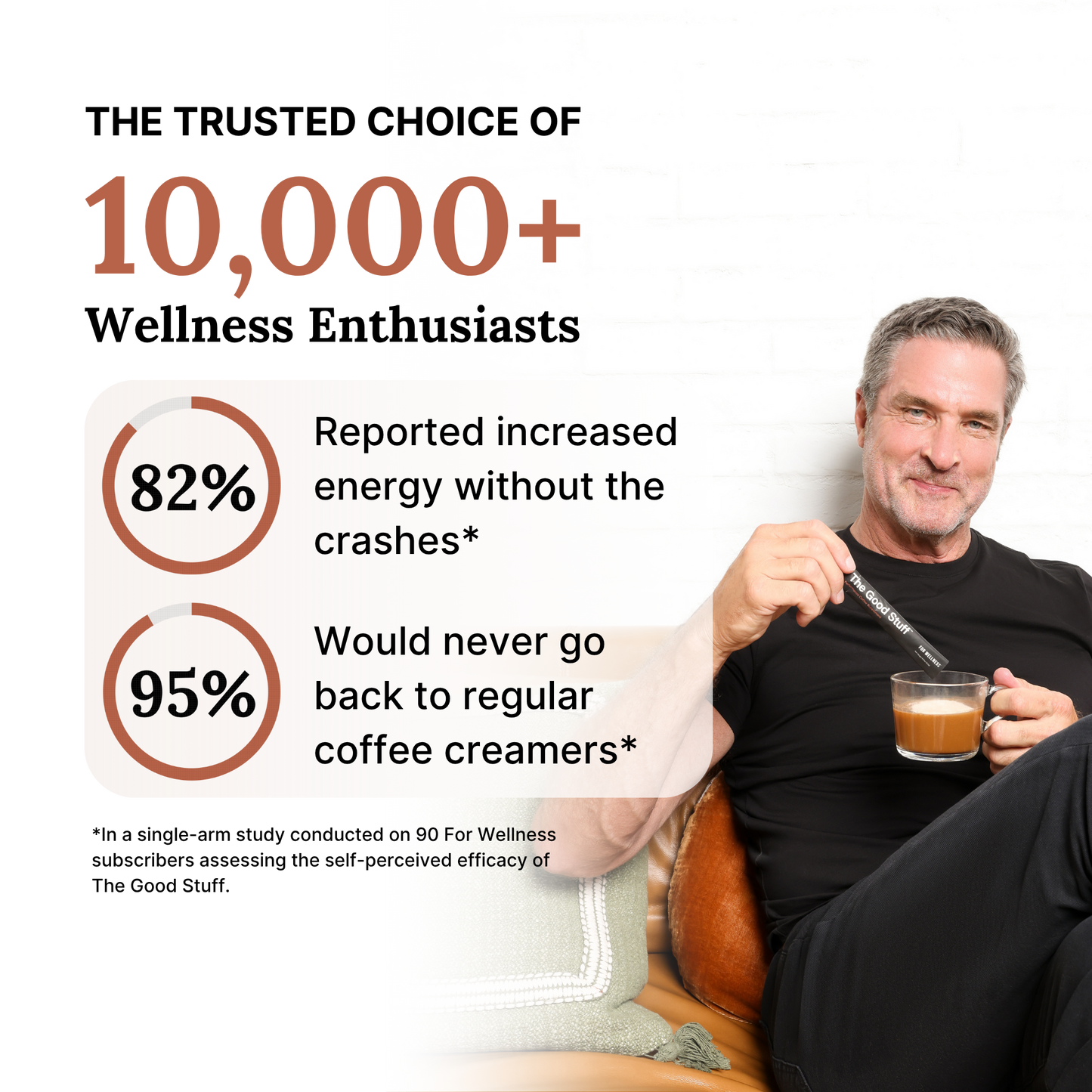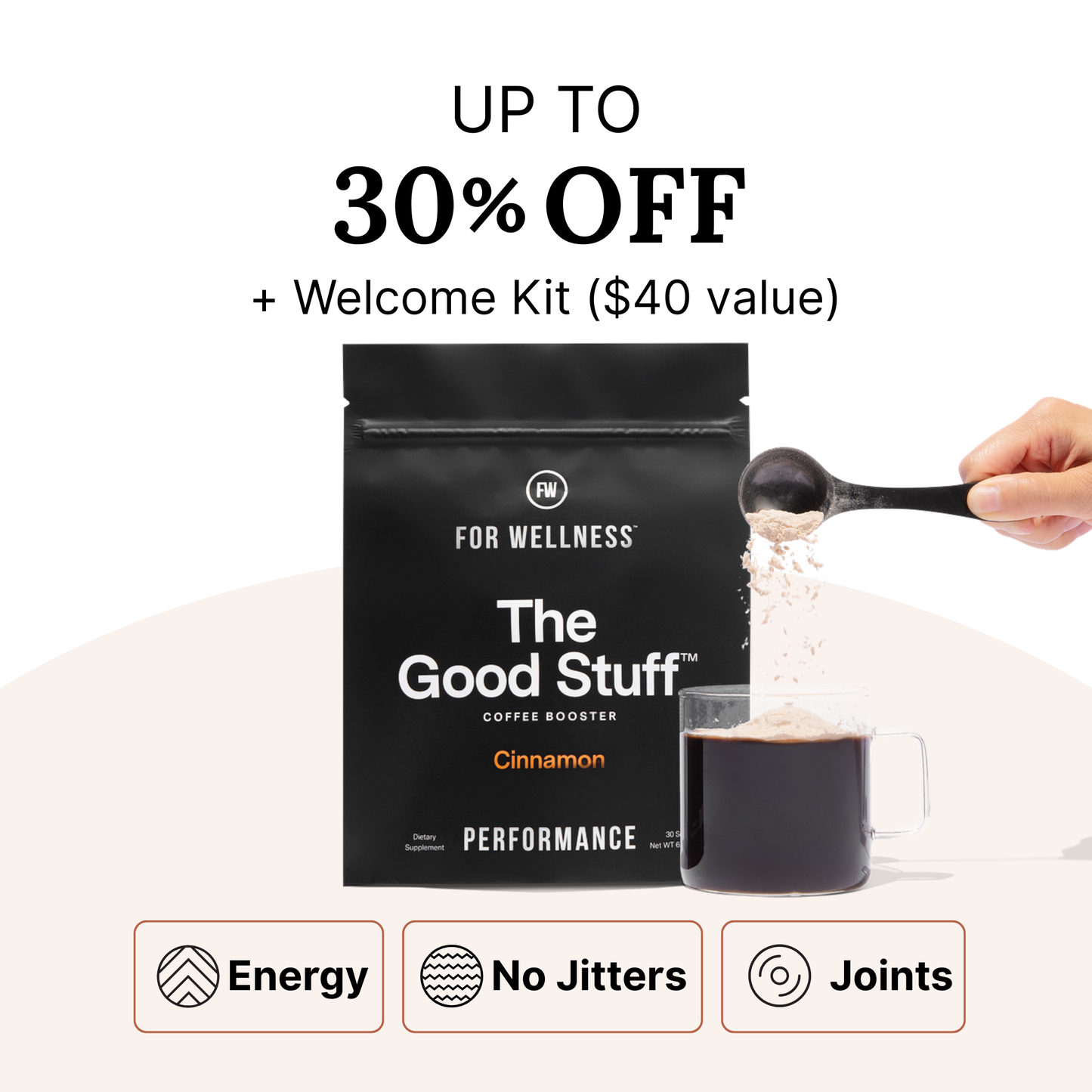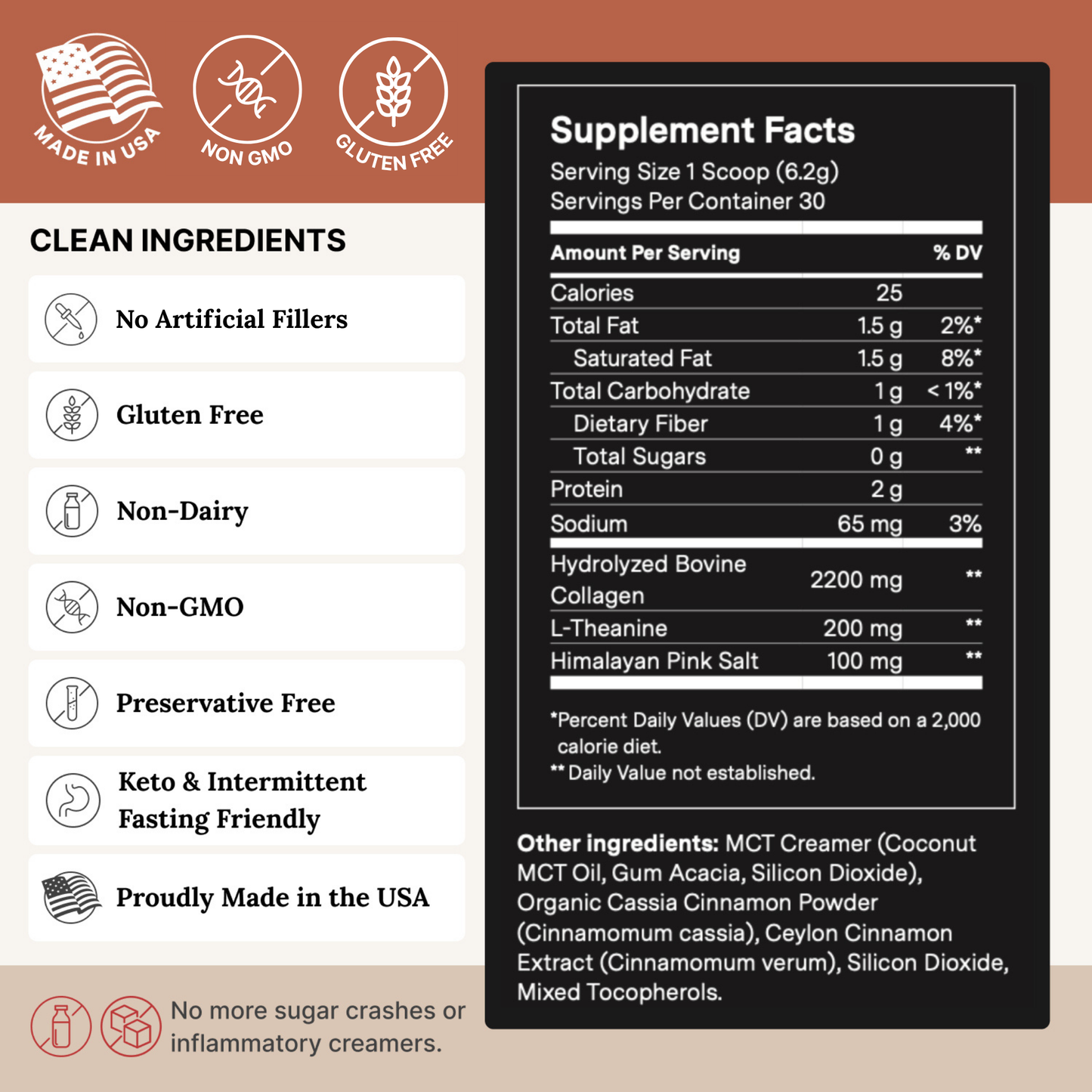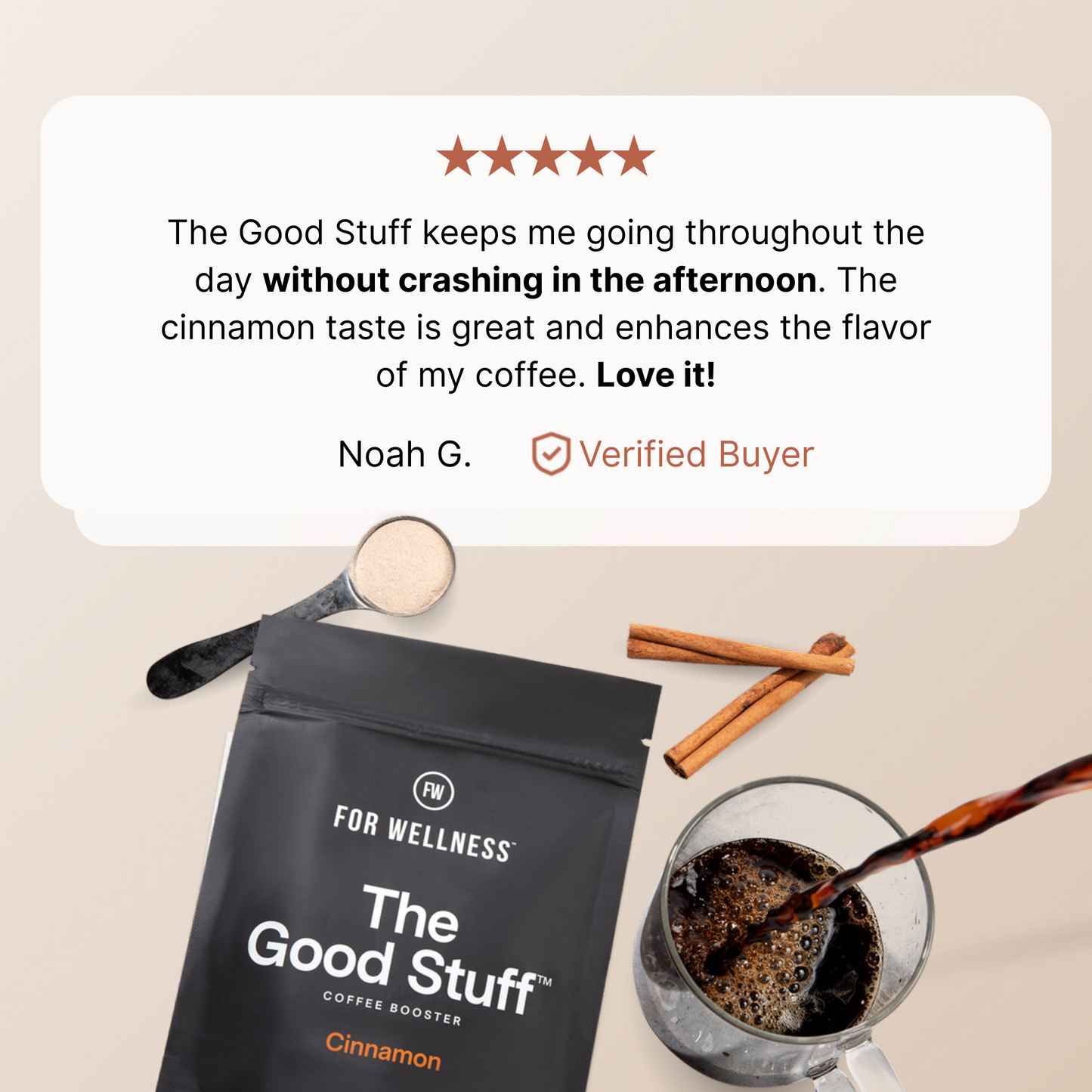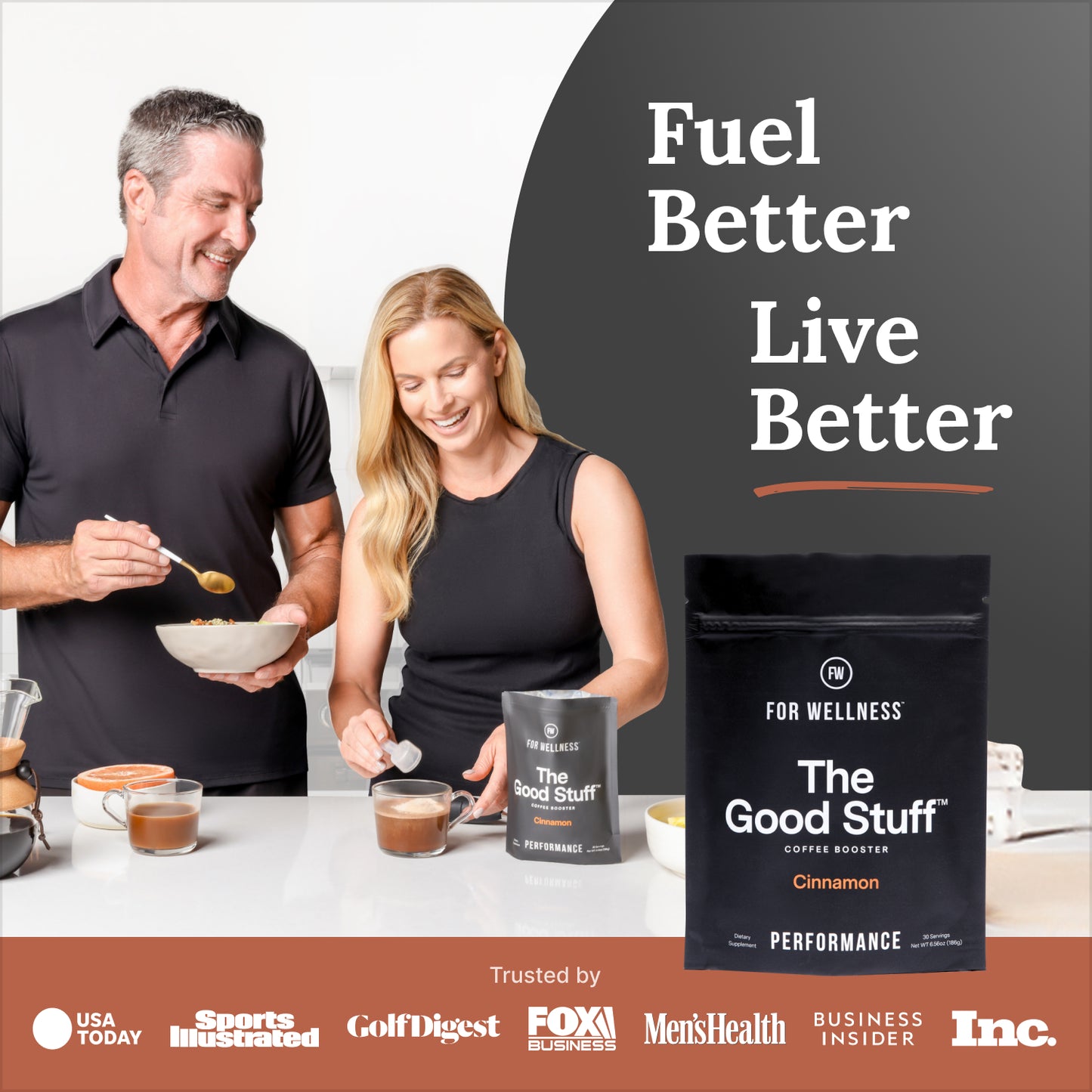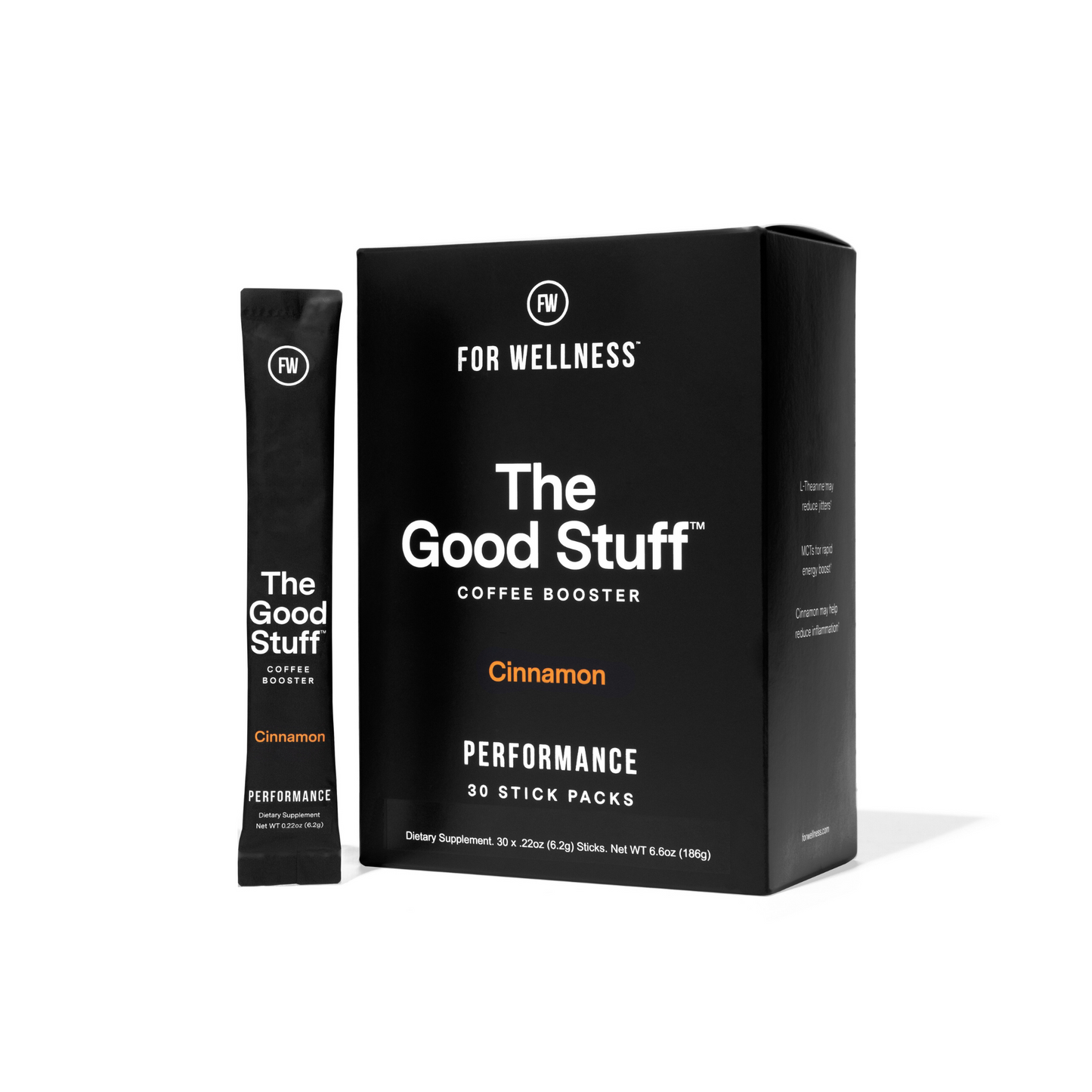As health-conscious humans seeking to optimize our wellbeing, we're increasingly asking more from the foods and drinks we routinely consume.
That's why we first invented The Good Stuff™, a coffee supplement that supports daily performance and helps fight inflammation.
However, we weren't stopping there.
Looking optimize not just the body, but the mind too, we've come up with an additional formula: The Good Stuff™ Focus.
The key difference between the two is that in addition to l-theanine, collagen, MCT oil, Himalayan salt and Ceylon cinnamon, The Good Stuff™ Focus contains a patented cocoa extract, which includes added theobromine to support mental acuity, memory and energy.
Here's why we chose this compound, and how it can support you.


The Good Stuff - Focus
-
Stimulates cognitive function and mental clarity.
-
Slow-release energy and mood enhancer.
-
Delicious mocha flavor you have to try to believe.
-
Unique formula, only available at For Wellness.
Let's start at the very beginning...
One of the easiest (and most common) ways we get the most out of our mornings is with a cup of coffee, not in the least thanks to the caffeine jolt it provides.
However, many coffee drinkers get anxious and jittery, and the energy from the caffeine doesn't last long enough.
That's why many people are turning to theobromine. Theobromine promotes slow-release, focused energy without the jitters, and it can support cognitive function and memory.
What is theobromine?
Theobromine is a natural compound that comes from cacao seeds. It's an alkaloid compound, which means that it contains nitrogen atoms. Molecularly, it's very similar to caffeine and even has some of the same effects.
It's classified as a stimulant but doesn't stimulate your central nervous system like caffeine.
Instead, it relaxes your smooth muscles. The smooth muscles are the ones that line vital systems in your body, like your digestive tract, for example.
It's widely known and used to promote focus and concentration.
History of Theobromine
Theobromine was first discovered from cocoa beans in 1841 by a Russian chemist, Alexander Voskresensky.
The compound was named "theobromine" because it is derived from the Greek words "theo" (god) and "broma" (food). This translates to "food of the gods", which should give you an idea of how highly regarded the compound is!
Natural Sources
Theobromine is typically found in cocoa, dark chocolate, tea plants, kola nuts, and yerba mate.
Extractors will take theobromine from these sources and put it into a supplement, which is exactly how we're able to supercharge your coffee with one scoop of The Good Stuff™ Focus.
How It Works
Theobromine interacts with receptors and blocks chemicals that initiate certain feelings. For example, theobromine can block adenosine receptors.
It's worth noting that theobromine doesn't enter the blood-brain barrier but can help improve your respiratory, circulatory, and excretory systems.
This receptor triggers the norepinephrine hormone, which will raise your blood pressure. When this receptor is blocked by theobromine, it'll lower your blood pressure.
How to Use Theobromine
One way to get theobromine is to take it as a supplement or eat foods that contain it, like cocoa powder or dark chocolate.
Cocoa is very nutrient dense and contains a lot of nutrients that can provide you with indirect benefits. For example, in just twenty-eight grams of cocoa, you'll get manganese, copper, magnesium, iron, potassium, phosphorus, Vitamin B12, and Zinc.
Natural theobromine supplements are another great way to get the benefits of this compound. You can add this supplement to your morning coffee or beverage of your choice. We recommend adding a scoop to your morning java as theobromine has a mocha taste which is delicious with coffee.
Theobromine vs Caffeine
Theobromine is often compared to caffeine because it has similar benefits and effects, but there are a few significant differences.
Both are compounds that are found in cocoa beans. However, theobromine is found in higher amounts in cocoa and chocolate products when compared to caffeine.
Both compounds are responsible for boosting energy and making people feel happier. These are typical feelings that people associate with coffee, tea, and chocolate.
Theobromine and caffeine are very similar on a molecular level as well. However, caffeine has one extra methyl, which is why caffeine can sometimes be overstimulating. Theobromine can't cross the blood-brain barrier, so it doesn't have that effect.
Cognitive Benefits
Theobromine is purported to feature an extensive list of cognitive benefits.
First of all, it can help improve blood flow, allowing your neurotransmitters fire correctly. Increased blood flow can lead to better concentration, attention, and memory.
In addition to that, theobromine can combat the aging of your brain too. Several studies have shown the compound benefiting older adults and assisting with cognitive function as they age.
Theobromine can also ease stress by helping reduce cortisol. Cortisol is the hormone associated with stress, and when you have too much of the hormone for an extended period, it can be detrimental to your health and happiness.
Energy
Both caffeine and theobromine make you feel more energetic. However, the energy you get with theobromine is slightly different from caffeine.
For example, theobromine gives you a refreshed feeling for extended periods. Some people have compared it to the feeling when you wake up after a good night's sleep.
Theobromine takes effect gradually. It relaxes your body while also increasing your alertness.
On the other hand, caffeine is felt suddenly, and its effect can wear off quickly. It can also cause your energy to spike, increasing anxiety for some people.
Your brain can get addicted to this cycle, even though it is counterintuitive. This doesn't mean that caffeine is bad for you, but theobromine might be a better long-term solution to give you more energy and help you overcome that tired feeling.
Anti-Inflammatory
Stress can cause inflammation in your body, which can lead to pain and all kinds of other diseases. For example, inflammation is associated with cancer, cardiovascular heart disease, Alzheimer's, and type II diabetes.
By decreasing inflammation, you can improve your overall health and reduce your risk of chronic diseases.
Theobromine has been studied for its anti-inflammatory properties and can help regulate the cell process. It also prohibits certain proteins and enzymes that promote inflammation.
Timing
Another difference between the two is the timing of the effect. Caffeine is water soluble, so you'll feel its effects about thirty or forty minutes after drinking your coffee.
Caffeine can last two and a half to five hours, but it also depends on how much an individual's overall tolerance.
On the other hand, theobromine is fat-soluble. This means it peaks in your blood about two or three hours after ingesting it. It has a much longer effect time, lasting seven to twelve hours.
Benefits of Theobromine
Improves Energy
As previously mentioned, theobromine is similar to caffeine in how it interacts with your body, because it blocks adenosine receptors.
Adenosine what makes you feel sleepy. By blocking your adenosine receptors, theobromine delivers a boost in energy energy. However, it may not be as noticeable as the energy boost you get from caffeine.
Helps Heart Health
Theobromine can help improve cardiovascular health as well, with research underway about whether it can help balance out cholesterol levels and reduce blood pressure.
The premise for this is that theobromine can help widen your blood vessels, allowing more blood to travel through your veins and arteries. The overall impact is decreased blood pressure and improved circulation.
Helps Focus
If you have trouble focusing on tasks during the day, consider trying theobromine.
It can help improve your cognitive function like caffeine, but it won't give you the intense anxiety that caffeine might cause.
It can also combat the chemicals in your brain that make you feel unfocused and groggy.
Improves Athletic Performance
Think it's just us banging on about the benefits of theobromine?
Many athletes take theobromine to improve their physical performance. For endurance athletes, theobromine can act as a bronchodilator, meaning it opens up the airway, making it easier to breathe and get oxygen into your muscles so they can work harder.
If you've ever checked your VO2 Max, you might be interested to learn that theobromine helps improve that metric. You can even check this on your fitness trackers!
Theobromine also helps by reducing fatigue and pain during exercise.
Improving the flow of the blood vessels and increasing stimulation makes it easier to work out.
In addition, since theobromine doesn't affect your sleep as much as caffeine, you'll be able to sleep better after taking it, without the nasty side effect of a restless night. When you can sleep better, you perform better athletically, cognitively and emotionally.
Helps Respiratory System
Scientists have also been studying the ability of theobromine to ease respiratory conditions.
Some research has shown it can help suppress coughs by blocking the nerves that send signals to your brain to tell you to cough.
For this reason, some patients with asthma have used it to increase airflow to their lungs and make it easier to breathe.
Is Theobromine Right for Me?
Before taking theobromine or any supplement, we recommend consulting your doctor.
They will advise you of any side effects or complications with your current medications.
Where to Find Theobromine Supplements
Keen to give theobromine a try?
Our unique formula in The Good Stuff™ Focus is specially designed to help you get the most out of you day with a dose of theobromine, plus so much more.
Ingredients and Benefits of The Good Stuff™ Focus
- Cocoa extract: contains theobromine for improved cognitive function, calmness, and memory.
- L-Theanine: helps combat the coffee jitters and improve calmness.
- Collagen: a key building block for our muscles, skin and hair.
- MCT oil: supports metabolism and combats cravings.
- Himalayan pink salt: helps balance hydration and electrolytes.
- Ceylon cinnamon: combats inflammation.

